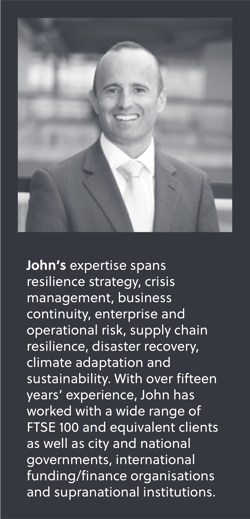In the Eye of the Storm: Maintaining Business Resilience in the Face of Climate Change
 For the past three years the World Economic Forum’s Global Risk Report has identified climate change as the top threat for global businesses. John White, does climate change present unique challenges that organisations should be prepared for?
For the past three years the World Economic Forum’s Global Risk Report has identified climate change as the top threat for global businesses. John White, does climate change present unique challenges that organisations should be prepared for?
Over a decade ago in a Royal Economic Society public lecture Sir Nicholas Stern cited that climate change represents the greatest market failure the world has seen. As we look forward to the 2020s, it seems inevitable that the consequences of a changing climate will force the greatest market correction as well.
With the science regarding climate change now fundamentally settled, organisations need to interpret not only how, why and where they are exposed to the impacts of a changing climate, but equally how the choices they make might exacerbate the risks ahead.
From a practical perspective, the changing climate is predicted to manifest itself in a variety of ways. Increasingly severe weather patterns, access to natural resources, strained labour markets, greater sustainability regulation, sea level rise – these are just a small selection of the issues global organisations will need to address. Ten years ago, you would be hard pressed to find these topics on a corporate risk register – they were thought of as issues to be left to future administrations. Today these challenges are clear and present.
Shareholders and customers alike expect business leaders to take action, albeit that the actions these two groups seek may not necessarily align. Tactical near-term interventions might protect current revenue, but these should be resourced in parity with medium- to long-term strategic change designed to reduce dependency on unsustainable revenue streams. The ideal time to start planning a transition to sustainable business may have passed, but the window is still open.
The ideal time to start planning a transition to sustainable business may have passed, but the window is still open.
For those businesses who choose to embrace the realities of a changing climate there is much that can be done. Looking to the future to predict how the environments and economies within which we operate will look in 20 years’ time will help identify how and where change will be required to remain fit for purpose.
What steps can organisations take to ensure they have the resilience to withstand challenges that are exacerbated by environmental degradation?
Fundamentally good decisions are based on good – although rarely perfect – information. As with all other areas of resilience the business should ensure actions are grounded in solid reasoning and supported by fact. The challenges associated with a changing climate will present as both near-term shocks and chronic stresses growing over time. Plans designed to respond to these challenges should reflect these timeframes.
A well-run business will already understand the extent to which key assets are critically linked to its long-term success – this is a natural outcome of good risk planning – and this data point forms the basis for the development of future scenarios. Only by identifying what matters most – people, physical infrastructure, supply chains, reputation, data, virtual infrastructure – can a business decide how and where to prioritise.
From here the questions become more clear: Which parts of the business are exposed to which hazards? How severe might the loss be? What are the options for and costs associated with risk reduction? How do we prepare for what we cannot predict or prevent? These are all very normal parts of the risk management process which most organisations should feel comfortable in exploring.
If we are collectively to rise to the challenges ahead, we must build an environment in which people are incentivised to make that happen.
What is of vital importance for all businesses wishing to evolve and thrive in the ‘new normal’ is the ability to honestly self-reflect. Rarely if ever is a disaster caused by a failure of a control. Controls are, after all, merely logic processes designed by and implemented by people.
Over seventeen years I have witnessed resilience from the perspectives of academia, public service, regulators, non-profits and financial markets. If there is one consistent across these experiences it is that short-termism, in particular short-term measurement and reward systems, are the root causes of almost all corporate disasters.
If we are collectively to rise to the challenges ahead, we must build an environment in which people are incentivised to make that happen. This means capability over compliance, a genuine change in leadership behaviour, and a willingness to enter a period of uncertainty in the knowledge that if we do not start soon, we may not find what we are hoping to on the other side.
We live in a society in which companies are often compelled to sacrifice long-term stability for short-term competitive advantage simply to stay alive. That does not make sense.

Read our 2020 Political Violence Special Edition for more global security insights.
